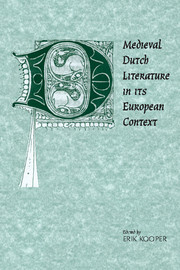Book contents
- Frontmatter
- Contents
- List of contributors
- Preface
- Map
- Introduction
- PART I COURT AND CITY
- 1 Court and city culture in the Low Countries from 1100 to 1530
- 2 Middle Dutch literature at court (with special reference to the court of Holland–Bavaria)
- 3 Heralds, knights and travelling
- 4 The rise of urban literature in the Low Countries
- PART II THE WORLD OF CHIVALRY
- PART III REYNARD THE FOX
- PART IV THE LITERATURE OF LOVE
- PART V RELIGIOUS LITERATURE
- PART VI ARTES TEXTS
- PART VII DRAMA
- Appendix A Bibliography of translations
- Appendix B Chronological table
- Index
2 - Middle Dutch literature at court (with special reference to the court of Holland–Bavaria)
Published online by Cambridge University Press: 13 October 2009
- Frontmatter
- Contents
- List of contributors
- Preface
- Map
- Introduction
- PART I COURT AND CITY
- 1 Court and city culture in the Low Countries from 1100 to 1530
- 2 Middle Dutch literature at court (with special reference to the court of Holland–Bavaria)
- 3 Heralds, knights and travelling
- 4 The rise of urban literature in the Low Countries
- PART II THE WORLD OF CHIVALRY
- PART III REYNARD THE FOX
- PART IV THE LITERATURE OF LOVE
- PART V RELIGIOUS LITERATURE
- PART VI ARTES TEXTS
- PART VII DRAMA
- Appendix A Bibliography of translations
- Appendix B Chronological table
- Index
Summary
The general attitude of students of medieval Dutch literature towards the relationship between Middle Dutch literature and the courts has often been ambivalent at best, and not infrequently downright negative. The fact that Middle Dutch literature at court is regularly seen as a contradiction in terms is related to a deeprooted view of the medieval Low Countries as a culture which is characterized precisely by its urbanization, and therefore may be called ‘bourgeois’ to a high degree. Another stumbling block, moreover, is the common notion that those members of the Low Countries aristocracy who aspired to high status must have used French as their language of culture. The court of the counts of Flanders is regarded as a prime example in this connection – and it is indeed striking that for this milieu, in the twelfth and thirteenth centuries for instance, a wealth of French literary connections can be collected, whereas the counts' ties with Flemish literature are few and far between. This appears to be a clear-cut case of two separate worlds: a strongly Frenchified nobility with hardly any interest in Middle Dutch literature, on the one hand, and a bourgeoisie with a great thirst for knowledge who were dependent on those very Middle Dutch texts for their cultural self-realization, on the other.
- Type
- Chapter
- Information
- Medieval Dutch Literature in its European Context , pp. 30 - 45Publisher: Cambridge University PressPrint publication year: 1994
- 1
- Cited by



